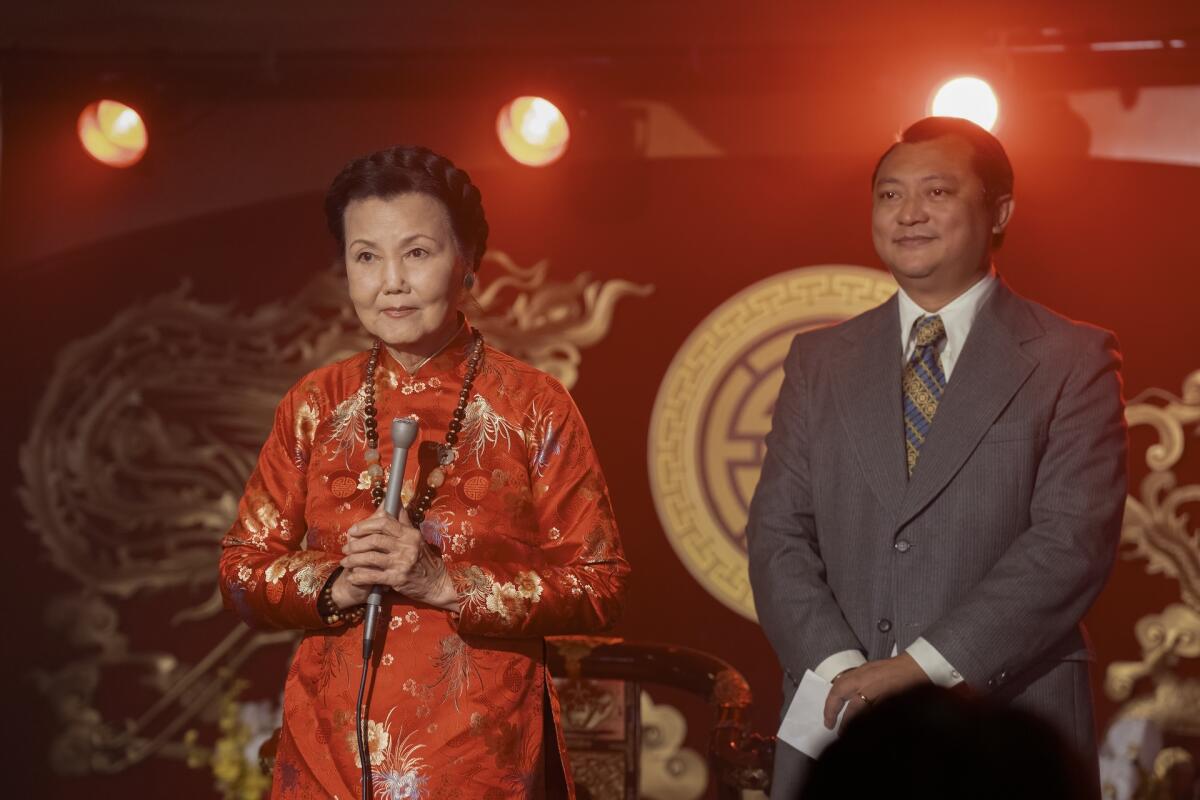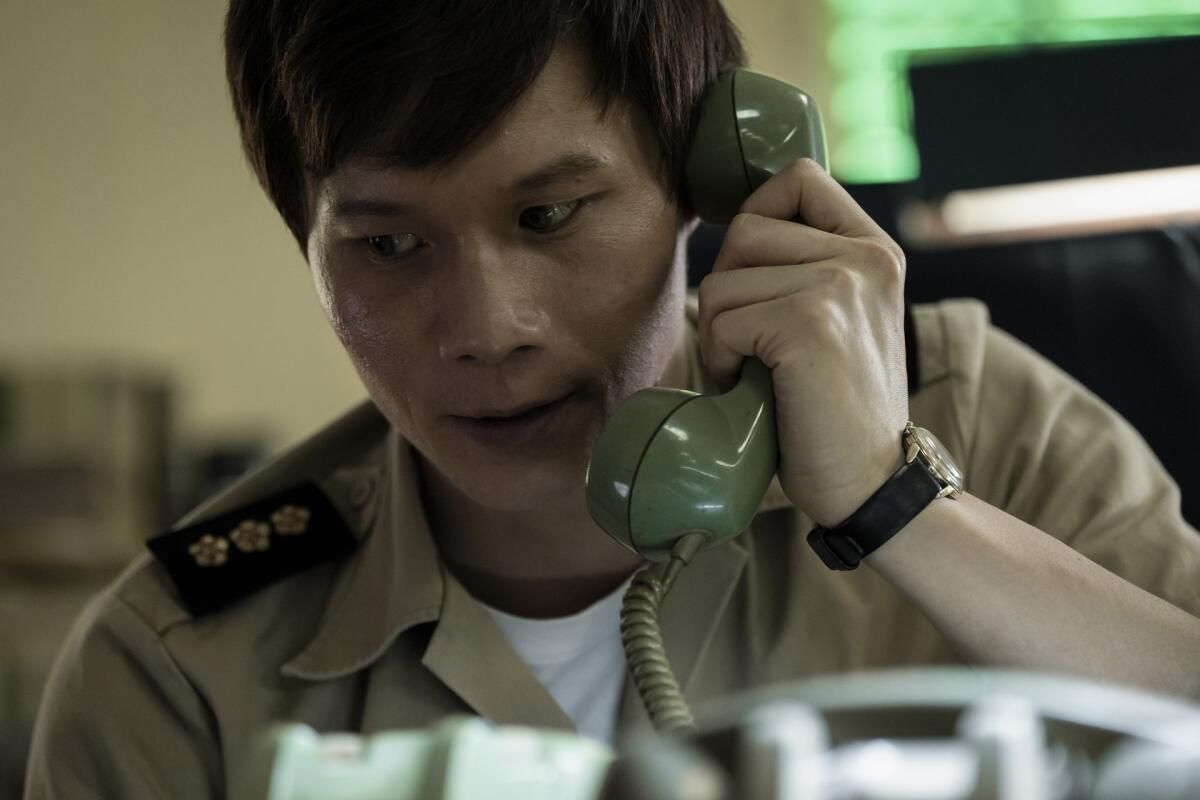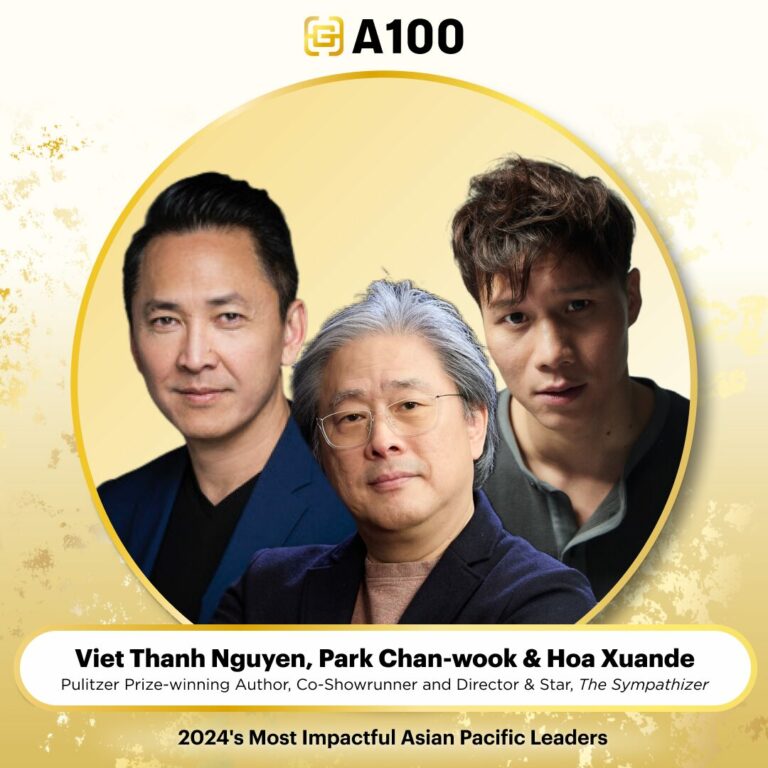Quyen Do writes about the Vietnamese community’s thoughts about the ‘The Sympathizer’s HBO series adaptation which aims to show the war in the Vietnamese perspective for Los Angeles Times

(Hopper Stone/HBO)
Never before has a television series garnered so much excitement, attention and concern among California’s expatriate Vietnamese community, the world’s largest, as “The Sympathizer.”
HBO’s seven-part espionage thriller depicting the Vietnam War and its aftermath — or the American War, as seen on the title card that opens the series — premiered Sunday and new episodes will air weekly through May 26. It was co-created by South Korean director Park Chan-wook and Don McKellar, and features Oscar-winning actor Robert Downey Jr. in several roles (he is also an executive producer). “The Sympathizer” is based on Viet Thanh Nguyen’s Pulitzer Prize-winning novel of the same name, which follows a French Vietnamese communist spy.
The series is groundbreaking for casting actors who are Vietnamese or of Vietnamese descent in lead roles and much of the dialogue is spoken in Vietnamese, though it was made for American audiences. And the opening episode takes place in Vietnam, depicting the fall of Saigon and a harrowing escape on an airstrip.
For a younger generation, the series is an opportunity to showcase Vietnamese stories globally, but for an older generation, “The Sympathizer” has stirred some discontent, especially among those who fought in the war. They point to the show’s lead character, the Captain — a communist spy who infiltrates the South Vietnamese army and follows the General, his boss, to Los Angeles, where they resettle — saying it glorifies the communists, the enemy — by presenting the spy’s disparaging viewpoints about the South.
Such sentiments were among those shared at a viewing party organized by Alan Vo Ford, held at Pink Moon, a Chinese restaurant in Beverly Hills, where the premiere episode was streamed for 30 friends from the Los Angeles and Orange County area on Sunday. Ford, 49, a Westminster resident, real estate broker and film producer of Vietnamese movies such as “A Fragile Flower” and “Journey From the Fall,” said he felt compelled to organize the event because it’s so rare for a major Hollywood series about Vietnamese people to be made.
“I felt it was my duty as a Vietnamese American to spread the word so the world would know about Vietnam and American history during this historic period of time,” he said. Ford said when he was a baby, his mother held him while “running and dodging bombs during the final days,” just like in the last scenes of the first episode. His father was in a reeducation camp for 9 years, and his family arrived in the U.S. in 1985.
“This is a breakthrough series for the Vietnamese community to be on HBO and work with superstars like Robert Downey Jr.,” said Don Nguyen, 55, a retired U.S. Air Force lieutenant colonel and cybersecurity consultant, who attended the party. He said that as someone who was part of the first generation of Vietnamese to join the U.S. military, he knows what it’s like to break barriers. “It’s a signal to the global community that we’ve arrived in Hollywood.”
“We have many talented doctors, lawyers, engineers [in the community]. But in films we’re still in the infant stage,” he said. He’s the son of Thanh Tuyen, a Vietnamese singer whose trademark Bolero songs were popular during the war.
Despite some of the generational differences, there is agreement in the community that this is a significant moment for Vietnamese representation in Hollywood that furthers their desire for more Vietnamese stories to be told.
And that’s what Viet Thanh Nguyen advocated for, to have the series, like his book, present a Vietnamese point of view on the war. He said that for too long, Hollywood has portrayed “Vietnamese characters to be killed, raped, wounded, silenced, demonized, or rescued while we serve as the backdrop for American moral dilemmas.” The war and its aftermath have been depicted in pop culture largely through an American lens in films such as “Apocalypse Now” and “Rambo.”
“We should have at least as many Vietnamese perspectives on this war being told as we have American perspectives,” he said.
The cast of the series is predominantly Vietnamese, with Hoa Xuande, an Australian actor of Vietnamese descent, in the lead role as the Captain. Other actors in supporting roles include Kieu Chinh, Toan Le, Fred Nguyen Khan, Vy Le, Nguyen Cao Ky Duyen and Alan Trong.
“This is a historical moment for Vietnamese artists, writers and filmmakers in Hollywood,” said Chinh, an acclaimed Vietnamese actress who plays the mother of the Major (Phanxinê, a Vietnamese filmmaker in his acting debut), a character whose story comes into focus midseason. She knows firsthand what the war was like, having lived through it. The chaotic evacuation scene at the end of the first episode was familiar.

(Hopper Stone/HBO)
“I heard loud bomb explosions all around us as we were trying to flee. It was frightening and very emotional,” Chinh said. “During the filming, I just relived my past. I didn’t have to act.”
The actor is well-known for her role as Suyuan Woo in 1993’s “The Joy Luck Club,” an adaptation of Amy Tan’s bestselling novel. It marked the first time that a film featuring a nearly all-Asian cast was a Hollywood box office success. However, despite the film’s success, it did not bring an increase in Asian-centered films or roles for Asian actors then. Chinh said she believes that “The Joy Luck Club” was too early for a breakthrough. Now, she thinks that it is time for a Vietnamese series to be featured on mainstream TV.
Anna Chi, a filmmaker whose work includes “The Disappearance of Mrs. Wu,” worked on “The Joy Luck Club” as a director’s assistant while studying at UCLA’s film school; she attended the viewing party with her husband, Douglas Smith, a visual-effects Oscar winner for “Independence Day.” She agrees with Chinh that “The Joy Luck Club” was ahead of its time. Although progress has been made, Chi said there is still much work to be done for Asian cinema. She sees “The Sympathizer” as an important step toward this goal.
While “The Sympathizer” isn’t the first time a story from a Vietnamese point of view has been told, previous efforts haven’t been as well received because of tensions that have lingered since the war. In January 1994, when Le Ly Hayslip, author of “When Heaven and Earth Changed Places,” visited Orange County on a press tour for the Oliver Stone film based on her memoir, dozens of protesters called her a traitor. It was billed as the first movie about the Vietnam War from a Vietnamese perspective, but anticommunist protesters were incensed that she had aided Viet Cong soldiers.
The premiere of “The Sympathizer” comes two weeks before the 49th anniversary of the fall of Saigon on April 30, known as Black April or Tháng tư đen in Vietnamese. The Vietnam War, the second longest war in U.S. history, killed hundreds of thousands of Vietnamese people and American soldiers. For those who fought on the side of the South and were displaced, the wounds from the war remain unhealed.
“Viet sensationalized things to fit the American spy novel and from that perspective, the show is very intriguing to the viewers. He wrote it from the perspective of a Viet Cong communist spy and therefore the South Vietnamese were depicted as corrupted and cruel,” said Quan Nguyen, a physician and director of the Museum of the Republic of Vietnam, a nonprofit in Little Saigon in Orange County. It was opened in 2016 to honor veterans who fought for South Vietnam and to educate future generations.
“This could reopen a lot of deep wounds within our anticommunist community,” says Quan Nguyen, whose father was an army physician.

(Hopper Stone/SMPSP/Hopper Stone/SMPSP)
Jenny Thai, 58, a guest at the viewing party who is from Garden Grove, agrees. Thai said it has inspired her to make a film of her own that highlights South Vietnamese heroes. She recalls when she was a child in Vietnam, in the final days of the war, everyone was huddled around the radio and the announcement came that Saigon had fallen, and the adults around her broke down in tears. Weeks later, all the men and women associated with the former regime were sent to reeducation camps. She says her family later escaped Vietnam by boat in 1990.
“Most of the Saigoners stayed home and listened to the radio. It was the only way we could follow what was going on,” says Thai, who has produced short films. “Only a small portion of those who worked with the embassy or with U.S. officers knew about the evacuation.”
She adds, “I’m anticommunist, but I don’t hate the Northerners. We are all Vietnamese; we are all brothers and sisters from the same country. It’s the politics that destroyed us, the war.”
Though there are differing views, “The Sympathizer” has nonetheless spurred conversations about representation in Hollywood, how the story of the war is told and by whom. Ysa Le, executive director of the Vietnamese American Arts & Letters Association, a nonprofit that co-hosted a “Sympathizer” screening and press meeting with the show’s cast in Orange a week before its debut, says she welcomes the series.
“For the first time, we have so many Vietnamese talents, both in front of and behind the camera working on this American series,” said Le, 53, a pharmacist in Fountain Valley. She was 5 when the war ended, and her father was sent to a reeducation camp for six years after being unable to flee Vietnam.
“It could inspire aspiring filmmakers to pursue their own projects,” Le said.
Phong Dinh, 91, a former two-term councilman of the seaside resort city of Vung Tau, Vietnam, who spent three years in a reeducation camp, said he understands the antipathy toward the communists, but the spy character created by Viet Thanh Nguyen and depicted in the series doesn’t bother him.
“It was a well-known fact they infiltrated our government since President [Ngo Dinh] Diem’s regime, and continued with President [Nguyen Van] Thieu,” he said. A father of seven, Dinh experienced tragedy after the war, losing his youngest daughter to malaria because no medication was available, and his wife suffered permanent hearing damage from an artillery explosion near their home.
Now a Huntington Beach resident, Dinh joined his youngest son, Viet, former Fox Corp. chief legal officer and U.S. assistant attorney general, to watch the premiere episode. He gave it an A+.
“Our people have suffered immeasurably. I’m blessed to have my family. I want my children and their children to be good citizens, contribute to society in America and help our people,” he said. “If this TV series opens doors for our younger Vietnamese, then it’s worth it.”


